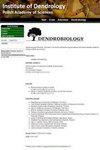控制条件下亚精胺对柳树贮藏后萌发的影响
IF 1.8
4区 农林科学
Q2 FORESTRY
引用次数: 0
摘要
柳树的种子发芽快,寿命短,在控制条件下难以长期储存。本研究的目的是研究三种柳属植物在控制温度(3°,- 10°,- 196°C)下储存的可行性。我们还分析了亚精胺(Spd)作为一种抗氧化因子在干燥种子中的作用。收集的种子干燥或水化,以获得10个水平的水分含量(约4%至2%),并在3°,- 10°或- 196°C的温度下储存(液氮;LN)。两个月后,种子在20°C的光照下发芽。在水分含量低于安全范围的情况下干燥的种子进一步测试,并在添加0.25 mM Spd溶液的滤纸上发芽。7天后,检测幼苗过氧化氢含量(H2O2)和总抗氧化能力(TAC)。将3种柳属植物波斯柳(S. aegyptiaca L.)、心叶柳(S. cordata micx .)和裂柳(S. ×fragilis L.)的新鲜种子在- 10°和- 196°C的温度下成功保存2个月。埃及沙蚕、cordata沙蚕和×fragilis沙蚕种子经低温保存后,水分含量分别在4.4 ~ 15.9%、6.4 ~ 18.5%和7.1 ~ 11.5%范围内,无活力损失。在干燥种子萌发过程中添加Spd对种子萌发能力没有影响。然而,与对照相比,埃及葡萄球菌幼苗的过氧化氢含量较低(在水中萌发)。山茱萸幼苗在LN中贮藏后,过氧化氢含量明显升高。Spd提高了杨柳幼苗过氧化氢含量。被试物种的种子对储存条件的反应不同。在- 10°或- 196°C的安全含水率范围内,柳树种子可以成功地储存两个月而不失去活力。3°C的储存可以用于种子含水量较窄范围的储存,但在此温度下储存的幼苗产生较高水平的活性氧。Spd对种子的萌发没有促进作用,而埃及埃及葡萄球菌和cordata葡萄球菌的过氧化氢含量降低本文章由计算机程序翻译,如有差异,请以英文原文为准。
Effects of spermidine on germination of Salix spp. after storage under controlled conditions
Willows produce fast germinating and short-lived seeds, difficult to store in the long-term under controlled conditions. The aim of this study was to examine the feasibility of storage of three Salix spp. at controlled temperatures (3°, −10°, −196 °C). We also analyzed the effect of spermidine (Spd) as an antioxidant factor in desiccated seeds. Collected seeds were either desiccated or hydrated to obtain 10 levels of moisture content (between app. 4% and 2%) and subjected to storage at temperatures 3°, −10°, or −196 °C (liquid nitrogen; LN). After two months, seeds were germinated on the light at 20 °C. Seeds desiccated below a safe range of moisture content were further tested and germinated on filter paper with additions of 0.25 mM Spd solution. After 7 days seedlings were examined for hydrogen peroxide content (H2O2) and total antioxidant capacity (TAC). Fresh seeds of three Salix species: Persian willow (S. aegyptiaca L.), heartleaf willow (S. cordata Michx.) and crack willow (S. ×fragilis L.) were successfully stored at temperature −10° and −196 °C for two months. After cryopreservation seed of S. aegyptiaca, S. cordata, and S. ×fragilis germinated without viability loss in moisture content ranging from 4.4–15.9%, 6.4–18.5%, and 7.1–11.5% respectively. The addition of Spd during germination of desiccated seed did not affect germination capacity. However, seedlings of S. aegyptiaca had lower hydrogen peroxide content in comparison with control (germination on water). Seedlings of S. cordata showed an increase in hydrogen peroxide content in control after storing in LN. In seedlings of Crack willow Spd increased hydrogen peroxide content. Seeds of tested species differ in response to storage conditions. Salix seeds can be stored successfully for two months at −10° or −196 °C without losing viability in the safe range of moisture content. Storing at 3 °C can be used for storage in the narrower range of seeds’ moisture content, however, seedlings stored at this temperature produce a higher level of reactive oxygen species. Germinating seeds in Spd did not increase their germination, however in S. aegyptiaca and S. cordata decreased hydrogen peroxide content
求助全文
通过发布文献求助,成功后即可免费获取论文全文。
去求助
来源期刊

Dendrobiology
农林科学-林学
CiteScore
2.20
自引率
11.10%
发文量
17
审稿时长
>12 weeks
期刊介绍:
Dendrobiology publishes original research articles and review articles related to the biology of trees and shrubs.
 求助内容:
求助内容: 应助结果提醒方式:
应助结果提醒方式:


